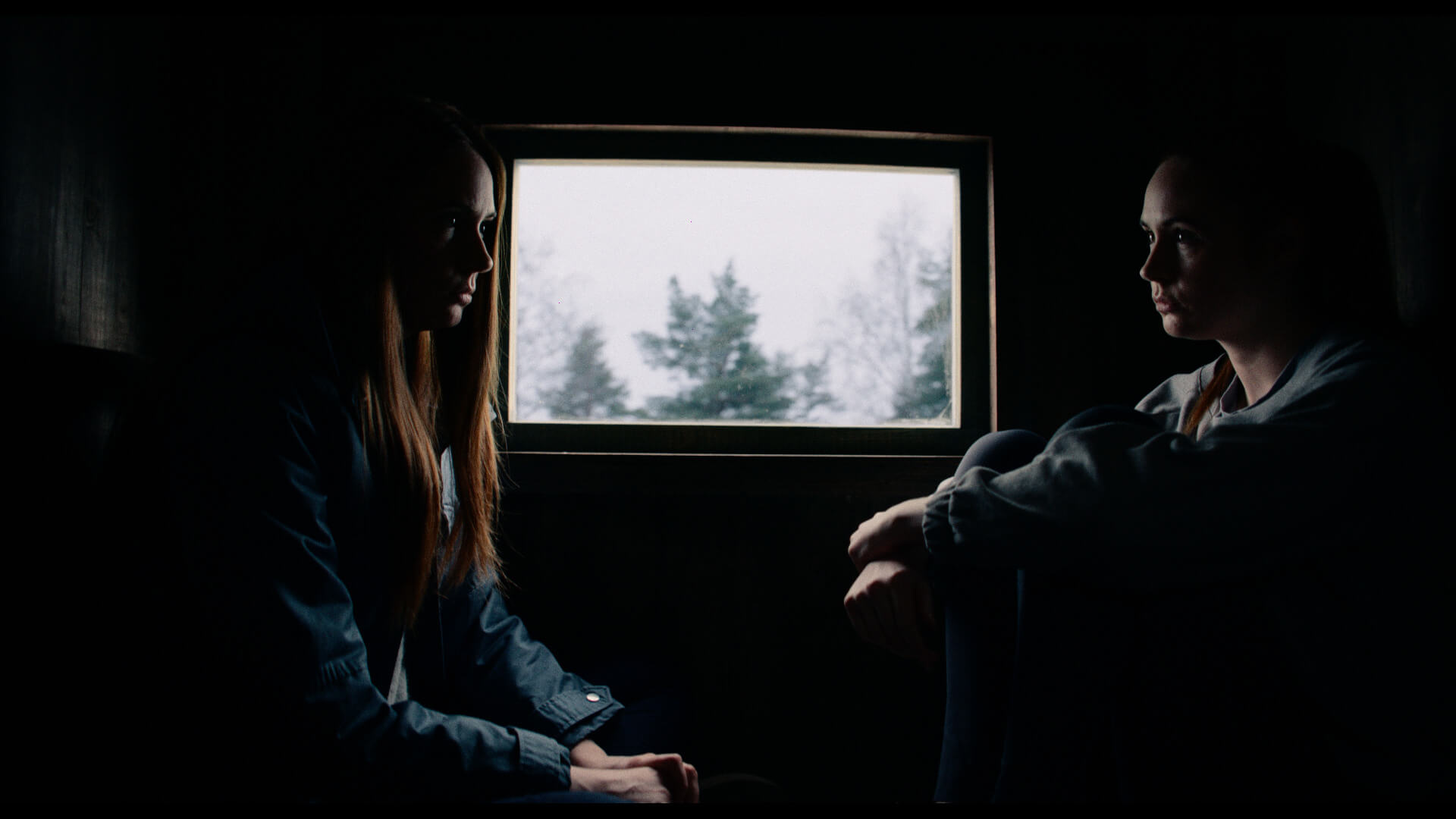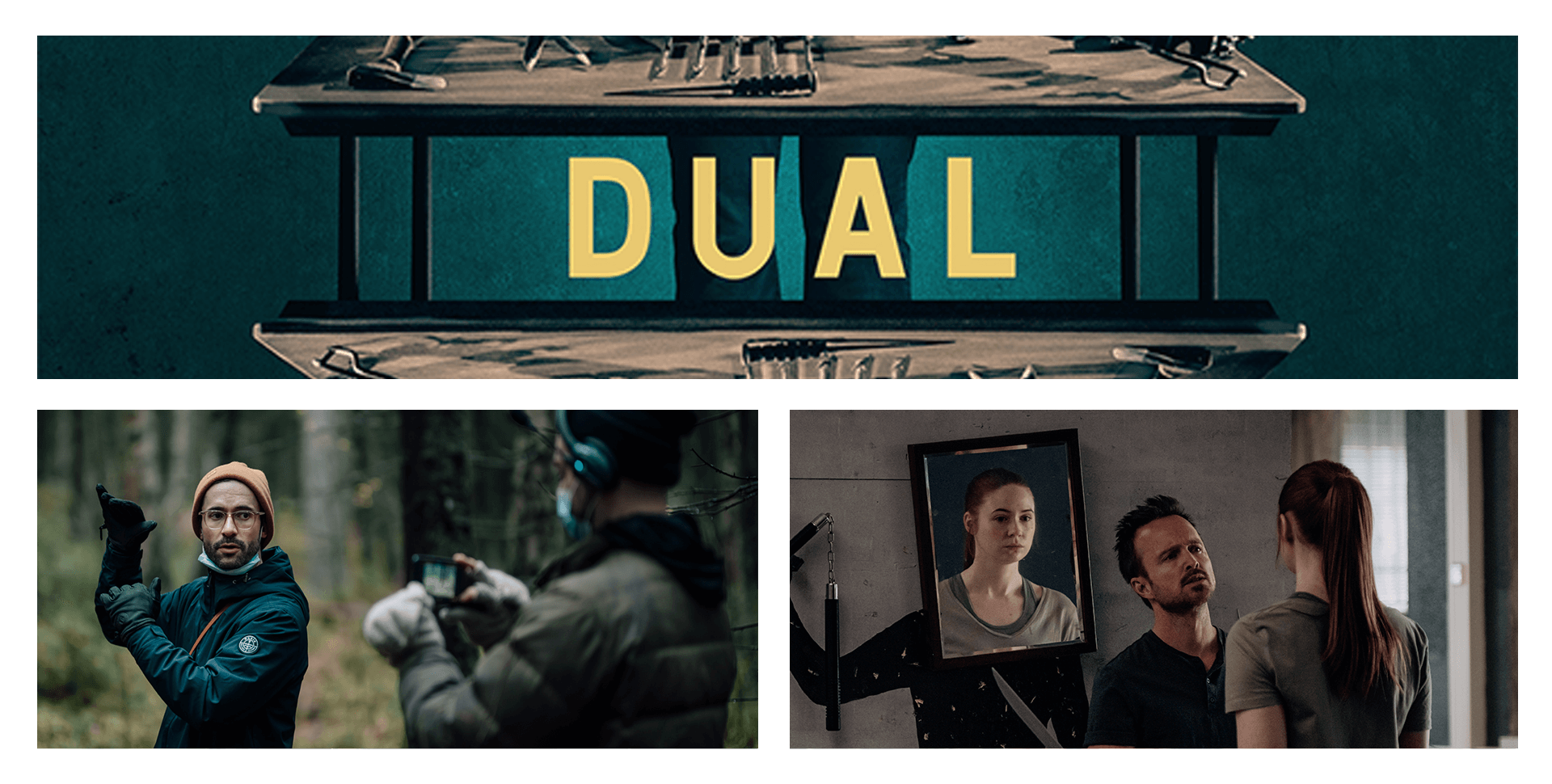From the creator of The Art of Self-Defense (Riley Stearns) comes the science-fiction thriller film Dual, which stars Karen Gillan, and Aaron Paul. The film follows Sarah (Gillan) a woman who gets a clone after being mistakenly told she has a terminal illness and is forced to prepare to engage in a government-sanctioned televised deathmatch against her clone.
Dual is showing in select theaters and will be released On Digital, On-Demand, and AMC+ on May 20.
Dual is a fresh breath of air in the sci-fi genre. The world of Dual is quite dystopian — cloning exists with a legal requirement to duel to the death as a form of televised entertainment for the masses if the situation calls for it. Can you tell us about your inspiration for the film and the overall writing process (e.g. plot, character, and worldbuilding)?
Dual started loosely as a short film script called Niche which I wrote after making Faults, I believe. Originally intended as something I’d shoot as a fun thing between features, it never ended up making its way to the screen. But basically, it had a character end up meeting a future version of themselves. For some reason, I couldn’t get the image of an actor to perform opposite themselves and eventually came up with the idea for the initial concept — if you know you’re dying you can have yourself cloned so that your family wouldn’t have to miss you. That was only part of the idea and I knew it. Dual didn’t become Dual until I thought, “What happens if you aren’t dying anymore? Well, they’ll have to duel to the death of course.” After that, I knew exactly what structure the film would follow including the ending that you see today. Everything sort of just started falling into place structure-wise after that.
Such a clever, ironic, and sad ending — the Original Sarah misses 'poisoning' as the correct answer to the quiz about 'ways to die' during training. Sarah's Double becomes utterly miserable when she finally replaces her. Can you tell us more about the ending and your rationale for ending it in this way?
Man, that’s such a hard question to answer because it just felt like the only way I could end it. The film builds to this duel that can never happen. The audience wants it to happen but either outcome of that duel would be expected and antithetical to the nature of the film and its depiction of the mundaneness of living.
People in the film tend to communicate with each other harshly, with a relatively flat affect — can you tell us more about this creative choice?
I guess the simplest answer to this is that this is the way I write and it’s what feels most natural to me. I like not having to adhere to a set way of speaking or a grounded interaction between people. Some people try to make their films feel as real as possible, whether that’s through naturalistic performances or improvised dialogue but for me, movies are always movies. I get lost in the world of a great film but I never for one second believe what I’m watching is real — so why not embrace the space and create a world and a style and a set of rules? It’s more fun for me that way. The removed delivery goes along with that. If a person says some of these lines of dialogue as a real person I don’t think they work. I think you need just let the dialogue speak for itself, within reason. I’m never telling my actors to talk like a robot, but I am asking them to try to remove superfluous emotion.
What factors came into play for conceptualizing the production design in Dual?
One of the simple answers that definitely still has to be considered for a film of our relatively small size is the budget. Weirdly, Dual has a lot more locations in it than I think I realized while writing it. Once I was boots on the ground in Finland and doing location scouts and discussing builds with my production designer, it became apparent that this 90-page script was “bigger” than I had always thought of it as. But we still managed to fill out this world with a muted but never boring pallet of varying pieces of technology and props. Even though it’s technically a science fiction film, I never wanted it to feel futuristic or big. The goal was for it to always feel grounded and familiar, but always just different enough from our world that it never felt too comfortable.

Great cast. Karen Gillan is excellent at acting both versions of Sarah and shows distinct differences in her performance playing them. What was the casting process like for Dual?
I never write with actors in mind — instead, I try to just write for the character and then find good people who are excited about the project to come in and help me bring it all to life. That’s exactly what happened with all the actors on Dual including Karen. I had a really nice meeting with her and a neighborhood cafe and basically offered her the role at the end of that. Karen is incredibly talented and I trusted her ability before we even met but at the end of the day, it’s most important to me that I work with people who care about the work they’re doing and treat those around them with respect. Karen is as kind and hardworking as she is talented. It was a dream scenario.
What are your favorite scenes in Dual — while on the set filming and in the final cut?
A side effect of the way that I write, almost a series of sketches in a weird way (at least that’s how Jesse Eisenberg described it to me one time), is that you’re never really doing the same thing day-to-day. Every day had its challenges but every day also had its fun. A scene that stands out as being incredibly fun to shoot both because it was a slightly different style of shooting for me and because of the actors’ enjoyment while filming it was the slow-motion fight training scene. Karen and Aaron both swore to me it was the funnest day on set that they could remember. They were a couple of little kids that day getting to pretend kill each other and it was a blast.
As far as the final film is concerned, I really love the way the support group scene turned out. I love that section of the film and the direction it takes but I have a particular soft spot for that scene because it takes a step back and briefly, looks at what these duels have done to the people who have had to fight in them. I love that there are three different monologues there from three characters we don’t know, and for a moment the world opens up and we get to see a little emotionality that we haven’t totally seen up to that point.
Where was the movie filmed, and how long did production last?
We shot in Tampere, Finland for 28 days (10-hour days).
The score for Dual — can you please tell us how it came to be?
I’ve been a big fan of our composer Emma Ruth Rundle’s music for a while now and while thinking about the film before I started writing it I couldn’t help but feel like her album “Electric Guitar: One” could be a soundtrack for the yet to be made movie. So, I reached out via Instagram DM and asked if she’d ever considered doing a score. To my surprise she not only replied but she said, “Yeah, I’ve always wanted to do something like that.” We hit it off and over the years became friends and the score she created elevates the film beyond anything I could have ever imagined.
What role does VFX play in Dual?
Our biggest VFX moments in the film are when Sarah and Sarah’s Double are on screen at the same time, specifically when the camera is also moving. We achieved this with motion control cameras that can recreate a specific move down to the pixel allowing us to shoot Karen as both characters and then join those two shots together as a fancy split-screen. I never wanted these moments to draw too much attention to themselves though so Playfight VFX, my cinematographer Michael Ragen and I all worked in tandem to make sure they felt as simple and natural as possible despite being quite complex effects overall.
What were the influences for the visuals of Dual — what was it like working with Cinematographer Michael Ragen again ("The Art of Self-Defense")?
I don’t remember Mike and I talking too much about specific references like other films or other forms of art, though I’m sure there were things here and there. Mainly we talked about color and mood. Our first two films together are very “yellow” and this time around I knew that we were going to be quite a bit “colder” through blues and greens. After three features and two short films together, we have a good shorthand that allows us to efficiently get what we need each day through a complete lack of ego. I’m definitely the director, but Mike is a trusted collaborator and will often suggest shots or a different approach to a scene that works better than my idea and I have no issue at all shifting gears and going down that better path.
How did you find the post-production process for Dual since you teamed back up with Editor Sarah Beth Shapiro (who edited "The Art of Self-Defense")?
Sarah Beth, like Mike, has now been on all three of my features. Similar to Mike, there’s a beautiful short-hand there that often allows her to know what I’m after before I even say it. There’s room for experimentation and playing around with structure sometimes but mostly there is a pretty set series of shots that can only work in a specific way and Sarah Beth knows exactly what I’m after. I also love that we’re both pretty optimistic people who love what we do. The edit never feels like a chore to us— if anything, it’s my favorite part of the process.
Which films/directors have influenced you as a filmmaker, including Dual?
Too many to write out here but the names that immediately come to mind are Paul Thomas Anderson, Stanley Kubrick, Hal Ashby, Kelly Reichardt, Yorgos Lanthimos, Miranda July, etc…
What are some of your favorite movies from the past decade?
Under The Skin, Kumiko: The Treasure Hunter, Mandy, The Killing of a Sacred Deer, The Grand Budapest Hotel. And so many more.
Which themes and subject matters interest you as a filmmaker?
Humanity through difficult times… but funny?
Read our spoiler-free review of Dual
Watch Dual Now
